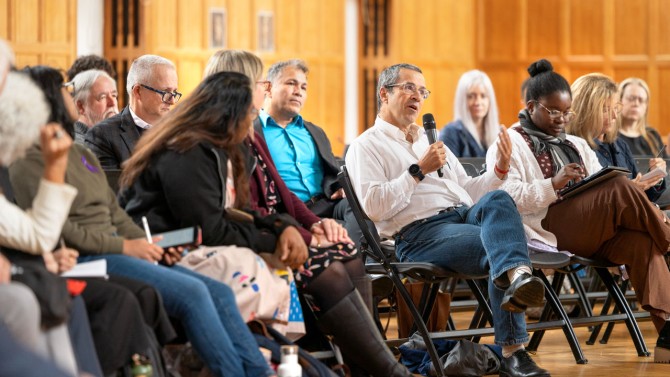
Dr. Robert M. Califf, commissioner of the U.S. Food and Drug Administration, center; with moderators Rachel Dunifon, the Rebecca Q. and James C. Morgan Dean of the College of Human Ecology, left; and Krystyn Van Vliet, vice president for research and innovation, right.
FDA commissioner in talk urges Cornell community to focus on US health
By Laura Reiley, Cornell Chronicle
“In the United States, it’s OK to fail. Talk to anyone who has been successful,” said Dr. Robert M. Califf, commissioner of the U.S. Food and Drug Administration, in his conclusion to an audience of Cornell students, staff, faculty and the Ithaca community at Willard Straight Hall on Oct 16. It was an exhortation to the scientists of tomorrow to attempt hard things in the face of urgent need, especially in the realm of Americans’ faltering health and well-being.
“Important things happen when people have the courage to do things differently,” he said. “How can it be that the U.S. spent $4.8 trillion on health care in 2023? It’s not being spent on the right things.”
The answer was in response to a question posed by moderator Krystyn J. Van Vliet, vice president for research and innovation, about how best to “take challenges and turn those into research, and then turn that into impact.”
The public event at Willard Straight Hall was part of a two-day visit by Califf to New York City and Ithaca, hosted by Cornell. Joined by FDA Deputy Commissioner Jim Jones and Tristan Colonius, the FDA’s chief veterinary officer and deputy director for science policy, Califf met with New York City hospital, university and government leaders, as well as faculty and student researchers. Prior to traveling to Ithaca, he sat down for a fireside chat with Dr. Robert A. Harrington, the Stephen and Suzanne Weiss Dean of Weill Cornell Medicine, where similar themes, and urgency, emerged.
“The U.S. is leading the world in innovation, creating new products, new ways of doing things, but we are almost in last place among high-income countries in terms of application of all of that know-how – in technology, in human health,” Califf said in his Uris Auditorium talk at Weill Cornell Medicine. “We’re essentially in last place and continuing to lose ground. I had hoped I would come to New York and learn what the magic ingredient is.”
In Ithaca, Van Vliet was joined at this fireside chat by Lorin D. Warnick, Ph.D. ’94, the Austin O. Hooey Dean of the College of Veterinary Medicine; Rachel Dunifon, the Rebecca Q. and James C. Morgan Dean of the College of Human Ecology; and Jeff Niederdeppe, senior associate dean in the Cornell Jeb E. Brooks School of Public Policy, all in conversation with Califf.
Dunifon asked about the FDA’s role in the current “food is medicine” philosophy among health care and nutrition professionals, in which food and diet are used to prevent, manage and treat disease.
Califf said that food safety is among the primary missions of the agency, but that, “a much bigger issue is chronic diseases, a much bigger issue is what are you eating every day and how does it affect your health?”
Mandating how and what people should eat is a tall order for what Califf describes as “a regulatory agency with a public health mission.” The agency is responsible for overseeing the safety of human and veterinary drugs, medical devices and biological products, cosmetics, tobacco products, products that emit radiation and the food supply – or as Califf says, 80% of the food supply (the USDA is responsible for the other 20%).
Safety in all these arenas is “Job No. 1,” he said. It’s how the agency got started, but a secondary mission is promoting innovation. And then there’s education: “The third part is explaining things to people,” Califf said. But before the federal government can advise citizens about healthy lifestyle choices, it must know what the science shows.
Califf spoke of the historic difficulty of managing huge datasets and conducting randomized control trials assessing the effects of certain foods and diets. He said there is good data to suggest a diet high in salt, sugar and carbs is not a good thing, but the research on ultra-processed foods is just underway.
“It’s a new day to figure out how this all fits together,” Califf said.
Niederdeppe asked about health inequality and science, as well as about the recent Supreme Court Chevron decision that shifts the balance of power between the courts and regulatory agencies, but what energized Califf was when Niederdeppe asked what students should know about careers that relate to policy design.
Califf said that it’s important right now for people with critical scientific knowledge to speak with friends and neighbors to staunch the flood of disinformation, and that young professionals should pursue the “great jobs in government that have a lot of influence on policy.”
But as the head of an agency that has come under fire for its handling of crises such as the recent infant formula shortage, he said he recognizes the delicate interplay of local, state and federal agents, as well as private industry and the American public. As an example, he used the agency’s recent efforts to test cow’s milk for pathogens such as Highly Pathogenic Avian Influenza that might be transmissible to humans.
“We can’t test milk unless states agree. And they can’t do it unless farmers agree,” he said.
It requires people and institutions that can bridge divides – rural/urban, political partisanship, economic disparities and others – to solve Americans’ concerning health trends and other pernicious problems. As a land-grant and Ivy League institution “with a really good health system,” he said, “Cornell is a particularly important place.”
KJ Bannan, a freelance writer for Weill Cornell Medicine, contributed to this story.
Media Contact
Get Cornell news delivered right to your inbox.
Subscribe

